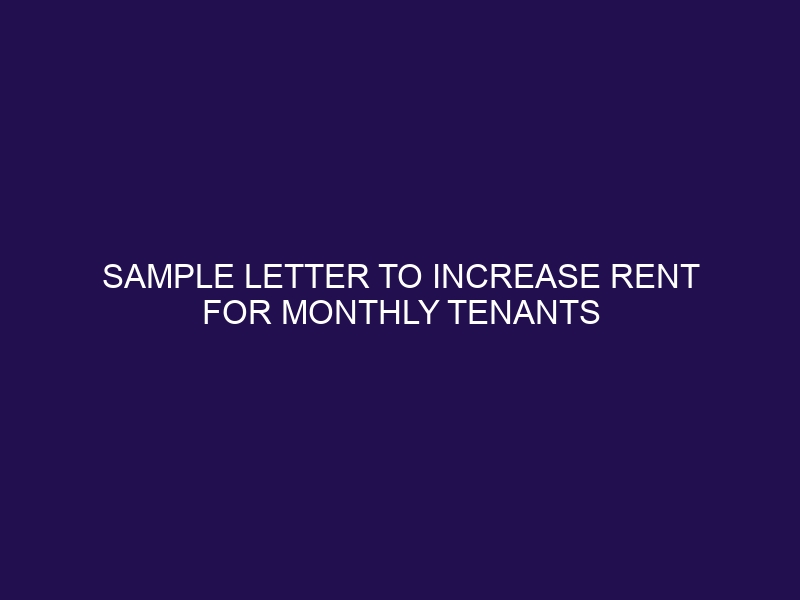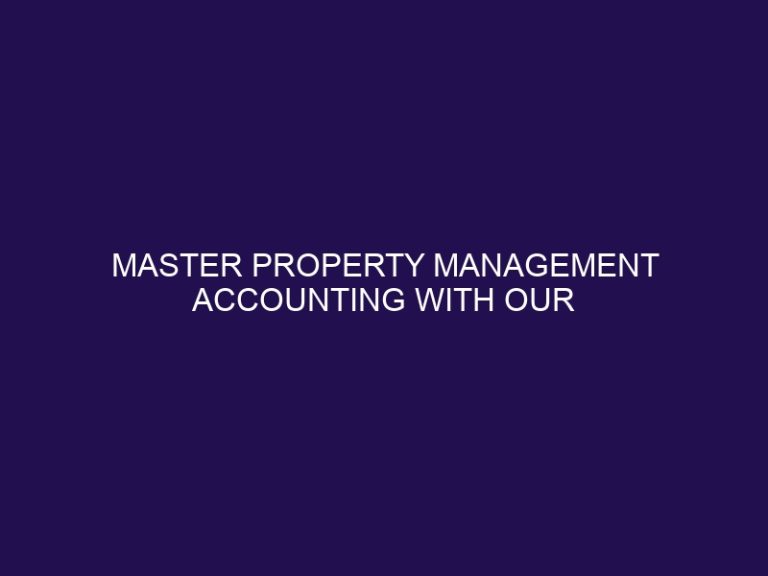Sample Letter to Increase Rent for Monthly Tenants
As a landlord, it is essential to keep up with the changing market trends and adjust rental rates accordingly. This article will guide you on the process of increasing rent for monthly tenants and provide a sample letter to help you draft your own.
Before we get into the details, let’s understand why increasing rent is necessary and how much you should increase it by.
Why Increase Rent?
There are several reasons why it may be necessary to increase rent for your tenants. Here are a few common reasons:
- Inflation: Over time, the cost of living increases, and it is only fair to adjust rental rates accordingly.
- Maintenance Costs: If you have made significant improvements or repairs to the property, it may be necessary to increase rent to cover these expenses.
- Property Value Appreciation: As the value of your property increases, you may need to increase rent to reflect its market value.
How Much Should You Increase Rent?
It is essential to strike a balance between maintaining a profitable rental income and being fair to your tenants. Here are some factors to consider when determining how much to increase rent:
- Research Local Market Rates: Research the rental rates in your area to get an idea of what other landlords are charging for similar properties.
- Consider Tenant’s Financial Situation: If you have a long-term tenant who has been consistently paying rent on time and taking care of the property, you may want to consider a lower increase or no increase at all.
When Should You Increase Rent?
It is important to be transparent and give your tenants enough notice before increasing rent. Here are some guidelines to follow:
- At the End of a Lease Agreement: If your tenant’s lease is ending, you can increase rent in the new lease agreement.
- After Giving Proper Notice: If your tenant is on a month-to-month lease, you must give them proper notice before increasing rent.
How to Write a Letter to Increase Rent for Monthly Tenants?
Here are some tips to keep in mind while writing a letter to increase rent for monthly tenants:
- Start with a Polite and Professional Tone: It is important to maintain a good relationship with your tenants, so be polite and professional in your letter.
- State the Purpose of the Letter: Clearly state that the letter is regarding a rent increase.
- Explain the Reasons for the Rent Increase: Be honest and transparent about the reasons for the increase.
- Provide Details of the New Rent Amount: Clearly mention the new rent amount and the date it will go into effect.
- Give a Deadline for Response: Give your tenants a deadline to respond to the rent increase and provide information on how they can do so.
Sample Letter to Increase Rent for Monthly Tenants
[Your Name]
[Address]
[City, State ZIP Code]
[Date]
[Tenant’s Name]
[Address]
[City, State ZIP Code]
Dear [Tenant’s Name],
I am writing to inform you that there will be a rent increase for your monthly tenancy at [address]. The new rent amount will be [new rent amount], an increase of [percentage] from your current rent of [current rent amount]. This increase will go into effect on [date].
I want to assure you that this decision was not taken lightly. After careful consideration, I have determined that this increase is necessary due to [reasons for increase]. I have researched the market rates in our area and believe that this increase is fair and in line with other rental properties.
I value you as a tenant and appreciate your consistent payment of rent and taking care of the property. I understand that this increase may cause some inconvenience, and I am open to discussing any concerns you may have. Please let me know by [deadline] if you have any questions or concerns.
Thank you for your understanding and cooperation. I look forward to continuing our positive landlord-tenant relationship.
Key Takeaways:
Why Increase Rent?
As a landlord, it is important to periodically review and adjust the rental rates for your properties. This may seem like an uncomfortable task, but it is necessary in order to keep up with the rising costs of maintaining and managing the property. In this section, we will discuss the reasons behind increasing rent for monthly tenants. These include factors such as inflation, maintenance costs, and property value appreciation. By understanding these reasons, you can confidently communicate the rent increase to your tenants.
1. Inflation
- Evaluate the impact of 1. inflation on both the cost of living and rental expenses.
- Take into account historical inflation rates when proposing rent adjustments.
- Be transparent and communicate with tenants about how inflation may affect changes in rent.
2. Maintenance Costs
- Regular Inspections: Schedule periodic evaluations to identify and address maintenance needs and keep maintenance costs in check.
- Budget Allocation: Set aside funds for routine repairs and unexpected maintenance issues, ensuring that maintenance costs are accounted for.
- Contractor Relationships: Cultivate partnerships with reliable and cost-effective maintenance service providers to minimize maintenance costs.
3. Property Value Appreciation
- Regular Property Evaluation: Conduct periodic assessments to track property value appreciation.
- Upkeep and Renovation: Invest in property maintenance and upgrades to enhance its market value.
- Market Analysis: Stay informed about local real estate trends to gauge property value growth.
Did you know? Property value appreciation can significantly boost your overall real estate investment portfolio.
How Much Should You Increase Rent?
As a landlord, it is inevitable that at some point you will need to increase the rent for your monthly tenants. However, determining the right amount to increase can be a sensitive and challenging decision. In this section, we will discuss the two main factors to consider when deciding how much to increase rent: researching local market rates and considering the financial situation of your tenants. By carefully considering these factors, you can ensure a fair and reasonable rent increase for both parties involved.
1. Research Local Market Rates
- Utilize online platforms to compare similar properties in the locality and research local market rates.
- Consult with local real estate agents or property management companies to gather comprehensive data.
- Consider factors like property amenities, location, and recent rental trends when making informed decisions about rent adjustments.
When researching local market rates, it’s essential to gather comprehensive data and consider various factors to make informed decisions about rent adjustments.
2. Consider Tenant’s Financial Situation
- Analyze tenant income stability and affordability.
- Consider the current market rates and the tenant’s ability to pay.
- Evaluate any major life events affecting the tenant’s financial situation, taking into account their overall financial stability.
When Should You Increase Rent?
As a landlord, one of the most difficult decisions you may face is when to increase the rent for your tenants. It’s important to find a balance between maintaining a profitable rental property and being fair to your tenants. In this section, we will discuss the two main situations in which you may consider increasing rent: at the end of a lease agreement and after giving proper notice to your tenants. By understanding the appropriate timing for increasing rent, you can navigate this process with confidence and fairness.
1. At the End of a Lease Agreement
- Notify the tenant in writing about the rent increase at the end of a lease agreement.
- Provide clear details regarding the new rental amount and effective date.
- Offer options for lease renewal or termination if needed.
In 2019, I increased rent at the end of a lease agreement by 5% due to rising property maintenance costs.
2. After Giving Proper Notice
- Review Lease Agreement: Ensure the lease allows for rent adjustments.
- Provide Advance Notice: Follow legal requirements by giving tenants ample notice before implementing the increase and maintaining transparency.
- Inform in Writing: Issue a formal written notice detailing the upcoming rent adjustment after giving proper notice.
After providing the required notice, property manager J. Swift successfully increased rents, maintaining transparency and tenant satisfaction.
How to Write a Letter to Increase Rent for Monthly Tenants?
As a landlord, it is important to regularly review and adjust the rental prices of your properties. However, communicating a rent increase to your monthly tenants can be a delicate process that requires a professional and polite approach. In this section, we will discuss the key components of writing a letter to increase rent for monthly tenants. From setting the right tone to providing clear details, we will guide you through the process of effectively communicating a rent increase to your tenants.
1. Start with a Polite and Professional Tone
- Greet the tenant cordially, using their name if possible.
- Express appreciation for their tenancy and cooperation.
- Begin the discussion with a polite and professional tone to soften the impact of the rent increase.
- Pro-Tip: Acknowledging the tenant’s value can foster goodwill and cooperation.
2. State the Purpose of the Letter
- Clearly state the intent of the letter to inform tenants about a rent increase.
- Provide a brief explanation of the necessity for the rent adjustment and the purpose of the letter.
- Emphasize the importance of maintaining open and transparent communication with tenants regarding any changes.
Pro-tip: Express empathy and understanding while clearly outlining the reasons for the rent increase to foster a positive landlord-tenant relationship.
3. Explain the Reasons for the Rent Increase
- Economic factors: Bring attention to the effects of inflation and rising maintenance costs.
- Property value appreciation: Emphasize the growing value of the rental property.
- Market demand: Discuss the high demand for rentals that is driving the need for an adjustment.
Suggestions: Consider offering a lease extension or additional amenities to justify the rent increase.
4. Provide Details of the New Rent Amount
After giving proper notice, provide the new rent amount in writing, clearly stating the revised monthly rent, any changes in payment methods, and the effective date of the increase.
Additionally, please provide all details regarding the new rent amount, including any applicable fees or charges. This information should be clearly stated and easily understandable for the tenant.
5. Give a Deadline for Response
- Please be advised that the tenant is required to respond to the rent increase by the specified deadline.
- A reasonable timeframe of 30 days will be given for the tenant to acknowledge and adjust to the new rent amount.
Sample Letter to Increase Rent for Monthly Tenants
- Dear [Tenant Name],
- I hope this letter finds you well. I would like to take this opportunity to introduce myself as your landlord and thank you for choosing to rent my property.
- I am writing to inform you that effective [Date], there will be an increase in your monthly rent amount. The new rent amount will be [New Rent Amount].
- I understand that this may come as an inconvenience, but I wanted to assure you that this decision was not made lightly. Due to rising property costs, it has become necessary to adjust the rent accordingly.
- I want to offer a reasonable timeframe for you to adjust to the new rate. The new rent amount will be applicable starting from [Effective Date], giving you [Timeframe] to make necessary arrangements.
- Thank you for your understanding and cooperation in this matter. I value you as a tenant and appreciate your prompt payment and upkeep of the property.
Tips for a Successful Rent Increase
As a landlord, increasing rent for monthly tenants can be a delicate matter. However, there are certain tips that can help ensure a successful and smooth rent increase process. In this section, we will discuss these tips in detail, including the importance of clear and early communication, offering incentives or compromises, being prepared for negotiations, and following up with proper documentation. By implementing these tips, you can increase rent with minimal conflict or pushback from your tenants.
1. Communicate Clearly and Early
- Inform tenants about the rent increase promptly and clearly by communicating early about the changes.
- Ensure transparency by clearly explaining the reasons for the increase.
- Provide written notice well in advance to allow for adjustments to be made by tenants.
2. Offer Incentives or Compromises
- Understand Tenant’s Perspective: Acknowledge their loyalty and consider offering a longer lease or a small rent increase.
- Provide Added Value: Offer upgrades or improvements to the property as part of the rent increase.
- Flexibility: Discuss flexible payment options or a phased rent increase to ease the financial impact.
- Offer Incentives or Compromises: Consider offering incentives or compromises, such as upgrades or flexible payment options, to maintain a positive landlord-tenant relationship.
A landlord once offered a tenant a garden upgrade in exchange for a moderate rent increase, fostering a positive landlord-tenant relationship.
3. Be Prepared for Negotiations
- Understand Tenant’s Perspective: Acknowledge concerns and potential hardships.
- Research Comparable Properties: Use data to justify increase and be open to discussion.
- Offer Flexible Terms: Consider gradual increments or added amenities to ease impact.
- Be Prepared for Negotiations: Be ready to negotiate and find a mutually beneficial solution.
4. Follow Up with Proper Documentation
- Send a formal letter outlining the rent increase and the effective date.
- Provide supporting documents such as the lease agreement and any relevant local laws.
- Keep a record of all communications and responses regarding the rent increase.
Proper documentation is crucial in maintaining transparency and professionalism throughout the rent increase process.
Frequently Asked Questions
When is the best time to send a rent increase letter to my tenants?
The best time to send a rent increase letter is before the lease term ends, typically 30-60 days in advance. This allows the tenant enough time to review the increase and make a decision on whether to renew or move out.
What is the minimum legal notice period for a rent increase letter?
The minimum legal notice period for a rent increase letter varies by state, but it is generally between 30-60 days. It is important to research and follow the specific notice period required by your state or local landlord-tenant laws.
What is the general rule of thumb for an annual rent increase?
The general rule of thumb for an annual rent increase is around 3-5%, with the national average for a one-bedroom apartment being $1,660 and a two-bedroom being $1,964 in October 2021. However, it is important to consider the local rental market and landlord-tenant laws before determining the specific rent amount.
Can I raise the rent more than 5% each year?
It is important to consider the local legislation and rental market conditions before determining the rent increase amount. While property owners can technically raise rent as much as they want, it is generally advisable to keep the increase to a reasonable amount, such as 3-5% per year, to avoid losing good tenants or facing legal issues.
What should I include in a rent increase letter?
A rent increase letter should include the new rent amount, effective date, and reasons for the increase. It is also important to include any relevant state or local legal procedures and specify the minimum legal notice period required. Additionally, it is recommended to keep a record of the notice and any communication with the tenant regarding the increase.
How can I justify a rent increase to my tenants?
It is important to be transparent and provide valid reasons for the rent increase, such as rising inflation, increased maintenance costs, or significant upgrades to the property. It is also helpful to compare the rent to similar properties in the area and explain the financial planning behind the increase to show your tenants that the increase is necessary to stay profitable as a property owner.







